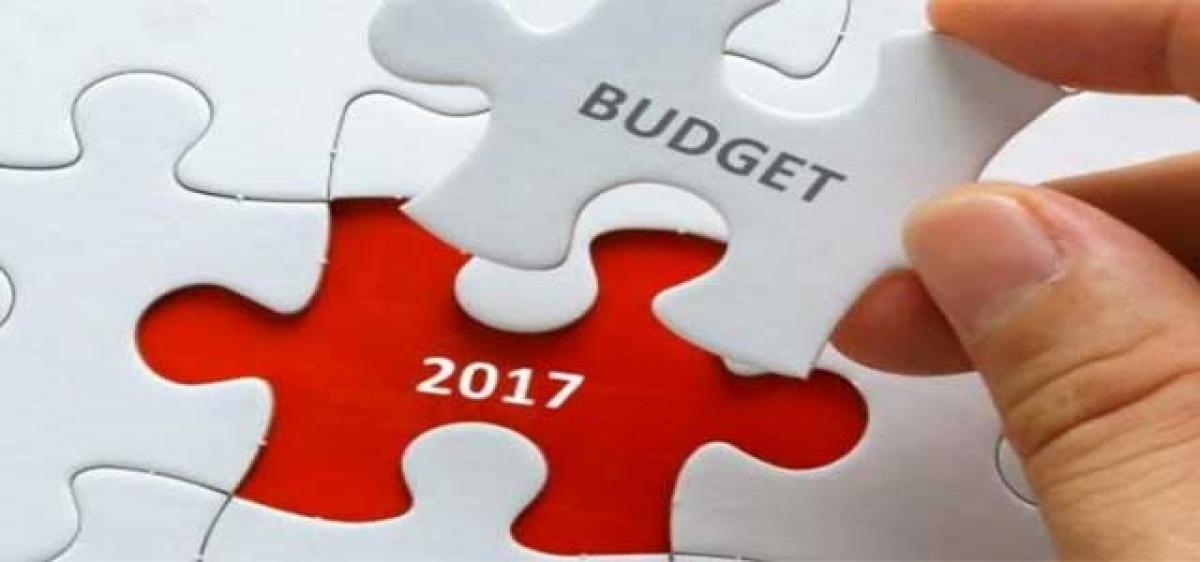Live
- Chanchalguda Jail Officials Say They Haven't Received Bail Papers Yet, Allu Arjun May Stay in Jail Tonight
- BJP leaders present evidence of illegal voters in Delhi, urge EC for swift action
- Exams will not be cancelled: BPSC chairman
- Nagesh Trophy: Karnataka, T.N win in Group A; Bihar, Rajasthan triumph in Group B
- YS Jagan condemns the arrest of Allu Arjun
- Economic and digital corridors to maritime connectivity, India and Italy building vision for future, says Italian Ambassador
- SMAT 2024: Patidar's heroics guide Madhya Pradesh to final after 13 years
- CCPA issues notices to 17 entities for violating direct selling rules
- Mamata expresses satisfaction over speedy conviction in minor girl rape-murder case
- Transparent Survey Process for Indiramma Housing Scheme Directed by District Collector
Just In

As the nation braces up for the post demonetisation and part-remonetisation budget of 2017, the fiscal signals are worth decoding. The uncertainty over the numbers emanating from the unpredictability of the impact of demonetisation constrains this budget exercise.
As the nation braces up for the post demonetisation and part-remonetisation budget of 2017, the fiscal signals are worth decoding. The uncertainty over the numbers emanating from the unpredictability of the impact of demonetisation constrains this budget exercise.
The Economic Survey to be released soon would provide us with the official estimates of various fiscal parameters, based on which the budget projections and proposals would be formulated. However, there is more or less unanimity in the government and non-governmental estimates that the demonetisation would dampen the economic growth rate.
The fall in GDP would adversely affect the quantum of revenue collection from both direct and indirect taxes in the ongoing financial year 2016-17 and the ensuing fiscal 2017-18.
The fiscal adversities due to demonetisation come against the backdrop of alarming levels of revenue deficit. According to the data released by Controller General of Accounts, the revenue receipts of the Government of India during April-October this fiscal was at 50.7 per cent of the budgeted estimates, as compared with 51.7 per cent in the corresponding period of the previous year.
The revenue expenditure was 60 per cent of the total. This resulted in the revenue deficit of 93 per cent of the budget estimates in the first seven months of the fiscal. Experts feel that it is higher than the budgeted revenue deficit which is caused due to underestimation of the fiscal impact of implementation of the Seventh Pay Panel.
The artificial monetary contraction due to demonetisation has induced recessionary conditions in the economy. This stifled and continues to limit consumption adversely affecting revenue collection. The cascading effect of this will be much higher revenue deficit.
The Q3 corporate results are also disappointing. The corporate results for the third quarter indicate a negative impact of demonetisation. A study of a sample of 160 companies reveals that profits have grown at the slowest rate in the past ten quarters.
This is essentially due to demand strangulation due to unprecedented cash crunch. The most affected sectors include automobiles, cement etc. However, certain sectors like oil, information technology, industrial chemicals etc. buoyed.
The sector-specific reasons are behind this buoyancy despite demonetisation. They include the rise in global crude oil prices, the firming up of US dollar and upward movement in commodity prices respectively. The inter-sectoral interplay on the GDP growth rate needs to be finally assessed keeping the hopes on government finances alive.
Yet, the higher fiscal deficit and revenue deficit seem to be imminent, though the gravity of it remains still inconclusive at this point of time.
The financial sector is beset with problems like undesirable levels of deposits due to demonetisation, growing burden of NPAs, low credit offtake etc.
The recovery in consumption demand is difficult to be estimated as the remonetisation is only partial till now and the viral impact of currency swap is yet to be assessed.
The roadmap for GST roll-out is still uncertain. The movement in the world oil prices is a matter of concern.
Meanwhile, the budget is advanced by a month, resulting in lack of clarity over the economic and the fiscal data. Thus, the government is groping about as the budget season dawns.

© 2024 Hyderabad Media House Limited/The Hans India. All rights reserved. Powered by hocalwire.com







